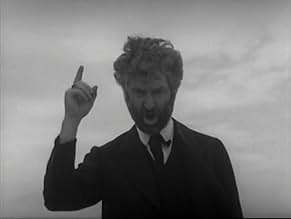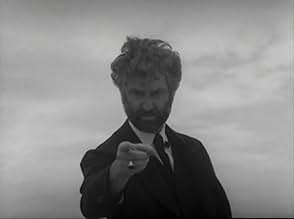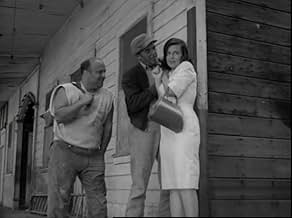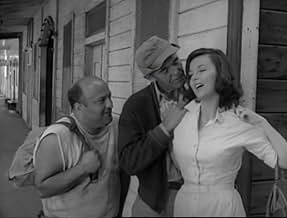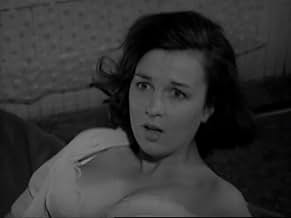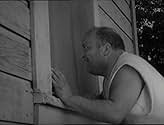Adicionar um enredo no seu idiomaThe unsatisfied wife of a salt miner experiences a sexual awakening after she is raped by, and subsequently falls in lust with, an escaped convict.The unsatisfied wife of a salt miner experiences a sexual awakening after she is raped by, and subsequently falls in lust with, an escaped convict.The unsatisfied wife of a salt miner experiences a sexual awakening after she is raped by, and subsequently falls in lust with, an escaped convict.
- Direção
- Roteiristas
- Elenco e equipe completos
- Produção, bilheteria e muito mais no IMDbPro
Avaliações em destaque
*** (out of 4)
Another Russ Meyer weirdo, which starts off rather slow but ends with a real bang. The big breasted Lorna isn't sexually satisfied by her dork husband so she has an affair with an escaped con. Going through this Meyer films it's rather amazing to see how much craft is actually involved in them. As I said earlier, I was expecting the poor trash that the likes of Something Weird releases but that's certainly not the case. Meyer delivers a pretty good, if simple story, mixed with some very good cinematography as well as a great music score. The first part of the film drags a bit but there's always Lorna's big breasts to keep us entertained. The film kicks into high gear during the final thirty minutes and is a real hoot.
Grand National Film Distributors thought they had a money-maker with Russ Meyer's Lorna (1964), rejected by the BBFC on 2 February 1965. Featuring Meyer's latest top-heavy discovery Lorna Maitland, the film is actually quite well made, by no means indecent and with an odd religious message. However, most councillors thought the story of a dissatisfied housewife who finds fulfilment with an escaped rapist unsuitable even for local adults, and the film was rejected nearly everywhere – until it reached Blackburn Borough Council. For whatever reason, their watch committee considered it perfectly OK for Blackburn folk to see Lorna do her stuff. And so, on 16 January 1966 at the Essoldo circuit's Royal Cinema in Ainsworth Street, Lorna was finally unveiled in public, probably the only time the Lancashire textile town had hosted a premiere. Disappointingly, the film ran only one week, and people were not coming from all over England to see Lorna perform. Undaunted, the distributors carried on touring local authorities and, in June 1966, tried to get the film passed in Southend-on-Sea. Essex County Council said nothing doing. Like Miss Maitland in the film, Grand National probably lost their shirts.
LATER SHOWINGS: After being banned in Southend-on-Sea, Lorna was later permitted a week on the Lincolnshire coast. Lindsey district council granted Lorna a local "X" and the film ran at the ABC cinema, Cleethorpes, from Sunday, 1 December 1968.
I found the violence in the film to be gratuitous albeit realistic and disturbing; as in Cherry, Harry, and Raquel, a later Meyer (color) film, the viewer is torn from (his) fantasy of passion and plunged into anger and terror. Why Meyer felt he had to mix the two escapes me, but therefore, his films are doubly memorable; along with the river scene, the shotgun blast from under the hood of the old car is equally etched.
Lorna Maitland, like Roberta Pedon of another genre, had a short stay in the limelight; with their early passing, they share a unique, cult-like icon status.
Beginning with the rape of a girl named Ruthie (Althea Currier), the two men responsible, Luther (Hal Hopper) and Jonah (Doc Scortt), travel to work and pick up Jim (James Rucker) on the way. Jim is married to the beautiful Lorna (Lorna Maitland), who is sexually unsatisfied by the nice-guy Jim. Luther proceeds to tease Jim about Lorna at work, while an escaped convict (Mark Bradley) forces himself onto Lorna. Lorna is extremely turned on, and invites the convict back to the house where she feeds and washes him. Clearly, it's not the most complex of plots, but we are in familiar Meyer territory with square-jawed men, put-upon women, and a funky jazz score.
One of the most familiar traits of a Meyer film is the narrator. Commonly, the role of the narrator in his films was to play the traditional man, one that obeyed the values and traditions of the 1950's American. The idea of sexual repression was clearly something that amused Meyer, and in Lorna, he employs James Griffith to play 'the Man of God', who is littered throughout the film addressing the audience directly to camera and questioning their moral fibre. He introduces the film, and this leads to one of the best moments in the films. He stands in the middle of a wide desert road, allowing the camera to glide past him and forward into the unknown as the jazz score kicks in. It's a lovely little touch, and a clear indication that this isn't simple another nudie-cutie.
This is far from his best work, with Lorna being relatively subdued in comparison to his more wilder visions such as Faster, Pussycat! Kill! Kill! (1965) and especially Beyond the Valley of the Dolls (1970), and Lorna's pandering to the violent convict may seem rather chauvinistic in comparison to the majority of Meyer's output, where the female was quite often the dominant sex. But this was only the beginning of a now widely- celebrated career, so Meyer was still very much honing his craft. His sense of humour is unmistakable however, and one of the standout scenes has the despicable Luther writing and performing a song about Lorna's adultery to Jonah. It's played out so naturally that the two start to really laugh, making the scene really quite wonderful. It's this kind of playfulness that make Meyer's output such as joy to watch.
www.the-wrath-of-blog.blogspot.com
Você sabia?
- CuriosidadesShot in 10 days.
- Citações
Lorna: [speaks to herself] Wham, bam, thank you ma'am... .
[thinks to herself]
Lorna: Is it me? Why can't they tell me what's wrong? Why can't he make love to me like the way he should? If he could only make me feel... the way HE feels when he... if he starts slowly... I'm a woman, not just a tool. Tomorrow will make one year... Happy anniversary to me. He's probably forgotten what day it will be...
- ConexõesFeatured in Mondo Topless (1966)
Principais escolhas
- How long is Russ Meyer's Lorna?Fornecido pela Alexa
Detalhes
Bilheteria
- Orçamento
- US$ 60.000 (estimativa)
- Tempo de duração1 hora 18 minutos
- Cor
- Mixagem de som
Contribua para esta página


